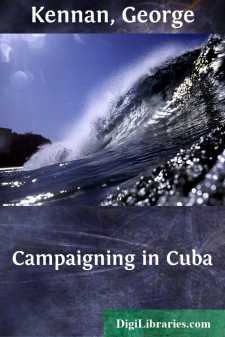Categories
- Antiques & Collectibles 13
- Architecture 36
- Art 48
- Bibles 22
- Biography & Autobiography 813
- Body, Mind & Spirit 142
- Business & Economics 28
- Children's Books 16
- Children's Fiction 13
- Computers 4
- Cooking 94
- Crafts & Hobbies 4
- Drama 346
- Education 46
- Family & Relationships 57
- Fiction 11829
- Games 19
- Gardening 17
- Health & Fitness 34
- History 1377
- House & Home 1
- Humor 147
- Juvenile Fiction 1873
- Juvenile Nonfiction 202
- Language Arts & Disciplines 88
- Law 16
- Literary Collections 686
- Literary Criticism 179
- Mathematics 13
- Medical 41
- Music 40
- Nature 179
- Non-Classifiable 1768
- Performing Arts 7
- Periodicals 1453
- Philosophy 64
- Photography 2
- Poetry 896
- Political Science 203
- Psychology 42
- Reference 154
- Religion 513
- Science 126
- Self-Help 84
- Social Science 81
- Sports & Recreation 34
- Study Aids 3
- Technology & Engineering 59
- Transportation 23
- Travel 463
- True Crime 29
Campaigning in Cuba
by: George Kennan
Description:
Excerpt
CHAPTER I
STARTING FOR THE FIELD
War broke out between the United States and Spain on April 21, 1898. A week or ten days later I was asked by the editors of the "Outlook" of New York to go to Cuba with Miss Clara Barton, on the Red Cross steamer State of Texas, and report the war and the work of the Red Cross for that periodical. After a hasty conference with the editorial and business staffs of the paper I was to represent, I accepted the proposition, and on May 5 left Washington for Key West, where the State of Texas was awaiting orders from the Navy Department. The army of invasion, under command of General Shafter, was then assembling at Tampa, and it was expected that a hostile movement to some point on the Cuban coast would be made before the end of the month.
I reached Tampa on the evening of Friday, May 6. The Pullman cars of the Florida express, at that time, ran through the city of Tampa and across the river into the spacious grounds of the beautiful Tampa Bay Hotel, which, after closing for the regular winter season, had been compelled to reopen its doors—partly to accommodate the large number of officers and war correspondents who had assembled there with their wives and friends, and partly to serve as headquarters for the army of Cuban invasion.
It was a warm, clear Southern night when we arrived, and the scene presented by the hotel and its environment, as we stepped out of the train, was one of unexpected brilliancy and beauty. A nearly full moon was just rising over the trees on the eastern side of the hotel park, touching with silver the drifts of white blossoms on dark masses of oleander-trees in the foreground, and flooding with soft yellow light the domes, Moorish arches, and long façade of the whole immense building. Two regimental bands were playing waltzes and patriotic airs under a long row of incandescent lights on the broad veranda; fine-looking, sunbrowned men, in all the varied uniforms of army and navy, were gathered in groups here and there, smoking, talking, or listening to the music; the rotunda was crowded with officers, war correspondents, and gaily attired ladies, and the impression made upon a newcomer, as he alighted from the train, was that of a brilliant military ball at a fashionable seaside summer resort. Of the serious and tragic side of war there was hardly a suggestion.
On the morning after our arrival I took a carriage and drove around the city and out to the camp, which was situated about a mile and a half from the hotel on the other side of the river. In the city itself I was unpleasantly disappointed. The showy architecture, beautiful grounds, semi-tropical foliage, and brilliant flowers of the Tampa Bay Hotel raise expectations which the town across the river does not fulfil. It is a huddled collection of generally insignificant buildings standing in an arid desert of sand, and to me it suggested the city of Semipalatinsk—a wretched, verdure-less town in southern Siberia, colloquially known to Russian army officers as "the Devil's Sand-box." Thriving and prosperous Tampa may be, but attractive or pleasing it certainly is not.
As soon as I got away, however, from the hotel and into the streets of the town, I saw at almost every step suggestions of the serious and practical side, if not the tragic side, of war. Long trains of four-mule wagons loaded with provisions, camp equipage, and lumber moved slowly through the soft, deep sand of the unpaved streets in the direction of the encampment; the sidewalks were thronged with picturesquely dressed Cuban volunteers from the town, sailors from the troop-ships, soldiers from the camp, and war correspondents from everywhere; mounted orderlies went tearing back and forth with despatches to or from the army headquarters in the Tampa Bay Hotel; Cuban and American flags were displayed in front of every restaurant, hotel, and Cuban cigar-shop, and floated from the roofs or windows of many private houses; and now and then I met, coming out of a drug-store, an army surgeon or hospital steward whose left arm bore the red cross of the Geneva Convention....



